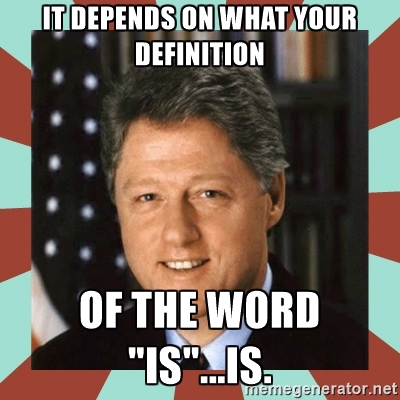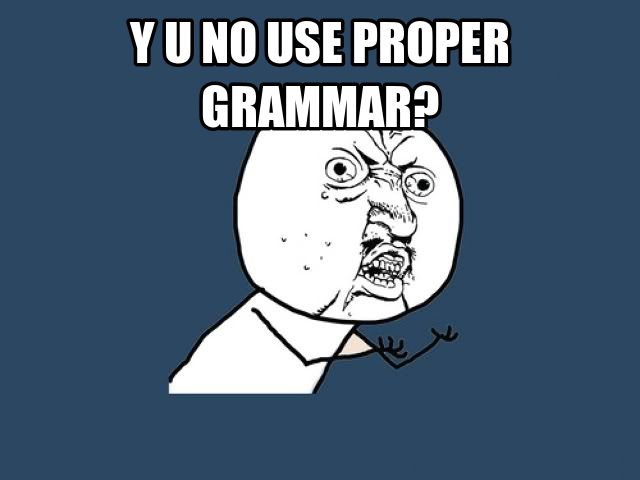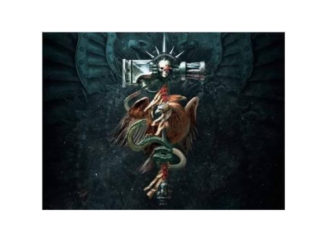
Ok, so here we are, brand new unit for your favorite army, dreams of paints schemes dancing in your head, plans to crush the unworthy before, and then you read the rules and BOOM: you are even more sold. Holy crap! They can do that?!
(Editor’s note: The new GW draft FAQ has finally clarified this…and well…Danny isn’t too happy)
But then you log on to your friendly forum or perhaps go to play, and someone says “No, they don’t do that. That’s not how the rule works.” Then you spend hours arguing over what the definition of “is” is.

Well, if you play GW games, then you are used to this. GW does not always take the best care of how they word their rules, so ambiguities sneak in. They don’t always check to see how new rules interact with other rules, and suddenly contradictions are present. The English language is itself a highly imprecise language, particularly at the most common level, and yep, the rules for 40k are written in conversational English.
So what do we do? Typically, we lean on larger entities like ITC/ETC/NOVA to make rulings for us, or even just our local TO, but when engaging in a rules reading, there are some serious pitfalls that can make the whole experience taxing.

– RAW vs RAW
This is the worst. What happens when the RAW (Rules as Written) has several meanings based on how you define the words used. A perfect example is the Broodkin ally matrix in White Dwarf. First, let’s for the sake of argument assume that White Dwarf has some authority to make rules (not everyone agrees with this), but they are the only source of rules for Broodkin in 40k at the moment, so we have to go with what we have. The rules clearly say “Broodkin ally like Tyranids“. Well, that was easy, that’s simple, right? Right?
No, because it depends which definition of “like” you are using (and trust us, as SoCal kids, we damn well know all about the power of like) Like is a strange word in English; it can fulfill almost all of the Parts of Speech, and well, much like other English words, its meaning it not very specific, yet it is used constantly.
Meaning 1: (as a preposition): “having the same characteristics or qualities”. By this definition, we see that the rule would say “Broodkin ally with the same characteristics as Tyranids.”, which quite literally means they ally in the same fashion, meaning they treat only themselves as Battle Brothers (BB) and all others as Come the Apocalypse (CTA). Yet, what does “the same characteristics” mean? There is certainly an argument that the “same characteristics” is itself vague as there is no definition of what characteristics mean in this setting. Do Broodkin treat Tyranids as BB and all others as CTA as that is also “the same characteristics” as Tyranids?
Meaning 2: (as a preposition): “similar to”. By this definition, we see again that rule produces, on the surface, similar results: “Broodking ally similar to Tyranids”. With this reading, it is still unclear what this actually means. It states similar which is not “equal to”, so what does similar mean? I suppose it means that allying with Tyranids as BB and everyone else as CTA is similar to Tyranids. This is still not precise though as the argument can be made that no, if they are allying “similar to” tyranids, this still creates confusion as Tyranids ally only with themselves as BB and everyone else CTA, so therefore, Broodkin only ally with themselves as BB as this would be “similar to” Tyranids.

So, at the end of the day, using either of the definitions of Like, one that is more definitive as “having the same characteristics or qualities” which the use of “same” denotes equality or interchangeability, or one that is a bit more fluid like “similar to”, we are left with the same level of ambiguity. Both of these arguments have merit, and from a purely grammatical reading, the meaning is unclear in application. What does “ally like” specifically mean? Does it mean “Broodkin ally like Tyranids in that they may only ally with themselves as BB and ally with all others as CTA” or “Broodkin ally like tyranids in that they are BB with Tyranids and CTA with all others“.
The answer is: Whatever the hell you want it to be, champ! Honestly, there is no easy answer here as without insight or clarifying information, there is no definitive way to read the text. So what do you do in the absence of an official FAQ? Well, now you have to go to RAI (Rules as Intended), which is a whole new level of hell (and the topic of another article!). At least GW is starting the FAQ train, so we’ll see how that helps (or hurts) the whole process.
Just remember: At the end of the day, crap like this happens, so if someone has a different reading of a rule than you, don’t immediately assume they need to “read harder”. GW just needs to be clearer in how they write their rules.




